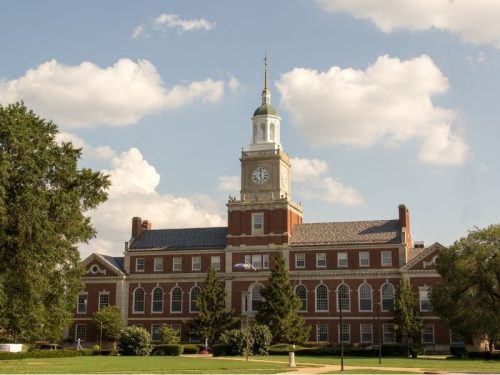Howard University, Washington DC
Established in 1867 by the US Congress with the intention of primarily serving the African-American community, HU is ranked among America’s Top 120 universities
Chartered in 1867 by the US Congress, Howard University (HU) is a federally chartered, private, undergrad-Ph D university consistently ranked among America’s Top 120. Sprawled across 258 acres in suburban Washington D.C, the national capital, HU is ranked #110 by the US News and World Report in its America’s Best Colleges Rankings 2018 while the Carnegie Foundation has classified it as a Tier 1 research university. A ‘historically black university’ — i.e, institution of higher education established before enactment of the Civil Rights Act, 1964 — with the intention of primarily serving the African-American community, HU has the distinction of producing the largest number of African-American undergraduates and Ph Ds countrywide. Howard also produces the largest number of minority doctoral graduates in computer science in the US and offers nationally ranked programmes in social work, business and the communication sciences.
Currently, HU has an enrollment of 10,000-plus students pursuing 120 study programmes in its 13 schools and colleges — business, law, dentistry, medicine, nursing, social work, pharmacy, communications, education, engineering and architecture, arts and sciences and divinity — mentored by 1,576 faculty. Notable alumni of Howard University include former US Supreme Court judge Thurgood Marshall, Pulitzer and Nobel Prize-winning author Toni Morrison and Emmy Award-winning actress Phylicia Rashad.
Washington D.C. The administrative capital of the United States, Washington D.C (pop. 670,000) hosts the White House and 177 foreign embassies making government, politics, and diplomacy the major ‘industries’ here. The city has stunning architecture in the form of the State Capitol, numerous government buildings and several iconic libraries of the Lincoln and Jefferson memorials. It also offers the world’s largest cluster of museums and research centres housing over 135 million artefacts in 19 museums. The National Mall, a large, open park, receives 24 million visitors a year and hosts political protests and rallies, as well as festivals and cultural events. America’s national capital offers excellent cultural education at its Verizon Center, and hosts five major professional sports teams.
Weather conditions vary through the year. Spring and fall (autumn) are generally mild (16°C-21°C), winters chilly (-10°C+10°C) with occasional snowfall, and summers are usually hot and humid (29°C-38°C).
Campus facilities. Sited on a hilltop overlooking downtown Washington D.C, Howard’s 258-acre campus hosts 115 buildings featuring state-of-the-art classrooms and laboratory facilities with equipment valued at over $1.2 billion. Prominent campus landmarks include the Andrew Rankin Memorial Chapel, Fredrick Douglass Memorial Hall, Founders Library, Howard University Gallery of Art, Interdisciplinary Research Building and nine halls of residence. Three separate quadrangles covering 5.8 acres serve as the epicentre of campus life.
The university’s library system comprising Founders Library, three additional branches in the schools of business, divinity, and social work, and the renowned Moorland Spingarn Research Centre, offer access to over 1.8 million volumes, including the Channing Pollock Collection, 14,000 current print and e-journal subscriptions, 3.4 million microforms and a media center. The Moorland-Spingarn Research Center is recognised as housing one of the world’s largest collections of Black literature.
Sports facilities are extensive and include the Greene Stadium, a 7,086-seats multi-purpose stadium (football, soccer and lacrosse), the Burr Gymnasium, a multi-purpose arena with a seating capacity of 2,700 which houses the Athletics Hall of Fame, a separate practice venue for basketball and volleyball, swimming pool and the ‘Pulse’, a 5,000-sq. ft workout facility. Moreover, there are over 200 student organisations, special interest clubs, honor societies, sororities and fraternities on campus.
The main campus apart, Howard University manages a 22-acre West Campus on which the School of Law is located, a 22-acre School of Divinity campus and support service facility in northeast Washington, a continuing education facility in Silver Springs and a 108-acre research campus in Beltsville, both in Maryland.
Admission. The minimum eligibility requirement for admission into Howard’s undergraduate programmes is successful completion of Plus Two. In addition, students need to submit SAT/ACT test scores of established testing agencies — (TOEFL (90) or IELTS scores (6.5).
The completed online common application form, together with a letter of recommendation from a guidance counselor/ principal/ head of school, a high school teacher and a non-refundable application fee of $45 should be submitted before November 15 for early action, March 1 for ‘regular decision’ (admission into the fall term) and September 15 for spring entry. Moreover, the university’s admissions office requires all foreign application documents to be ‘evaluated’ by WES (World Education Services).
For graduate admissions, the minimum requirement is completion of a four-five year bachelor’s degree programme or Masters degree. All official transcripts (evaluated by WES) and TOEFL scores need to be submitted together with the online application form and a non-refundable application fee of $45 before August 1 for entry into the spring term.
For further information, contact Howard University, 2400 Sixth Street NW Washington, DC 20059; Ph: 001 202-806-2763; email:[email protected]; website: www2.howard.edu
Accommodation. The university offers nine on-campus halls of residence — two separate halls for men and women and five co-ed residences. Accommodation options range from standard double rooms to shared apartments with full kitchens. Other facilities include high speed Internet access, cable, ResNet computer labs, exercise equipment, vending machines, laundry facilities and lounge areas.
Degree programmes. HU’s 13 schools and colleges offer 66 undergraduate majors, 51 graduate majors, 31 doctoral programmes and 10 professional programmes (see box).
| SCHOLASTIC OPTIONS AT HOWARD |
| Howard University’s 13 schools and colleges offer a wide range of undergraduate, postgraduate, doctorate and professional programmes. They include: The Graduate School of Arts and Sciences; the Schools of Business, Communications, Divinity, Education, Law, and Social Work; and the Colleges of Arts and Sciences; Dentistry; Engineering, Architecture and Computer Sciences; Medicine; Pharmacy, Nursing and Allied Health Sciences.
For detailed information of study programmes offered by each school/college, visit www2.howard.edu Bill of costs (per year) |
Sruthy Susan Ullas
















Add comment